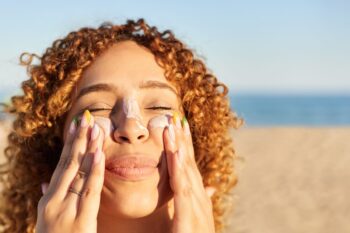
How to Adapt Your Skincare Routine to Different Environments
 As an expat, adjusting to a new climate means more than updating your wardrobe. From sunburn to frostbite, dry air to pollution, your skin faces new stressors, so your self-care routine should evolve, too.
As an expat, adjusting to a new climate means more than updating your wardrobe. From sunburn to frostbite, dry air to pollution, your skin faces new stressors, so your self-care routine should evolve, too.
Proper skincare in a new environment is one of the most important things you can do for your health. As the body’s largest organ, your skin deserves the same attention as your heart, teeth, and eyes – including daily care and routine checkups.
Read on for practical skin care tips to keep your skin healthy abroad, and learn how to access care if a skin condition arises.
As an expat, adjusting to a new climate means more than updating your wardrobe. From sunburn to frostbite, dry air to pollution, your skin faces new stressors, so your self-care routine should evolve, too.
Proper skincare in a new environment is one of the most important things you can do for your health. As the body’s largest organ, your skin deserves the same attention as your heart, teeth, and eyes – including daily care and routine checkups.
Read on for practical skin care tips to keep your skin healthy abroad, and learn how to access care if a skin condition arises.
Protecting Your Skin in a Hot Climate
Whether you’re used to a sunny climate or are living in one for the first time, it’s essential to minimize sun exposure and take proper precautions when spending time outdoors. This is particularly important given the global rise in skin cancer, especially melanoma.
Your Biggest Adversary? The Sun
According to the International Agency for Research on Cancer (IARC), approximately 330,000 new cases of melanoma were diagnosed worldwide in 2022. Moreover, nearly 60,000 deaths were attributed to the disease. Projections indicate that by 2040, the number of new cases could increase by more than 50%.
This surge is largely due to increased sun exposure, tanning bed use, and an overall lack of adequate sun protection. This underscores the importance of sun safety, no matter where your expat journey takes you.

Some countries and regions experience more intense sun exposure than others due to factors such as:
- Altitude
- The angle of the sun
- Holes in the ozone layer
- Proximity to the equator
For instance, New Zealand and Australia require extra precautions due to the large hole in the ozone layer. Meanwhile, cities like Quito, Ecuador, near the Andes mountains, experience harsher sun exposure because of their high altitudes.
In these areas, the sun can be much stronger, and you’re more likely to get sunburned quickly. High-altitude regions are also often very dry, which makes the sun's effects on your skin even worse.

Find the Best International Medical Insurance
- Compare multiple quotes and coverage options
- Work with an insurance expert at no additional cost
- Find the best plan for your needs and budget
If you’re moving to a high-altitude area, it’s especially important to focus on hydrating your skin and taking additional sun protection measures to reduce the risk of skin damage.
In these environments, focus on cleansing your skin gently as part of your skincare routine, rather than scrubbing. Additionally, drink more water than usual and consider getting a humidifier if the dry air irritates your skin.

Do your homework! Before moving abroad, research the climate and consider the factors that might affect your skin. Don’t forget to check if your international health insurance covers dermatology appointments and sun-related health concerns in your new location. Ensure your policy gives you access to the care you may need if a skin condition or emergency arises.
Pack the Skin Care Essentials and Schedule a Screening
As you get ready to move to a warm, sunny country, be sure to pack a sun safety kit with essentials to protect your skin from harsh UV rays.
This should include:
- Aloe
- Caps or wide-brim hats
- Chapstick with lip sunscreen in it
- Long or protective clothing such as a swimshirt
- Sunglasses with lenses that have 99% to 100% UV absorption
- Water-resistant sunscreen with UVA and UVB protection with an SPF of 30 or higher
Beyond taking these preventative skin care measures, it’s also important to visit a dermatologist for annual skin checks. During this appointment, the doctor will do a full body scan of your skin to check for anything out of the ordinary.

Be sure to point out any new moles, freckles, or spots on your skin that have changed. It could be a sign of skin cancer. If your doctor thinks they see a cancerous spot, they might burn it off or do a biopsy.
The earlier you catch a suspicious spot, the better your chances are of treating it, which is why it’s important not to skip an annual screening.
Certain people are more prone to developing skin cancer, such as those with fair skin and light eyes or a history of sunburns, but anyone can develop a cancerous spot.
After you’ve relocated, find a dermatologist who’s covered by your health insurance and book your skincare check-up. This way, you'll ensure that you have access to quality care, wherever you are.
When to Treat a Sunburn at Home or Visit a Doctor
Even if you wear sunscreen and pack a hat, sometimes you may end up with a sunburn. If it’s mild to moderate, you can treat it at home with aloe, lotion, ice, cold water, and over-the-counter pain medicine such as ibuprofen. You should also drink extra water and avoid the sun until your burn fully heals.
If you end up with a severe burn, you may need to seek medical attention. If you experience blisters on a large portion of your body or fever, headache, severe pain, or nausea with your sunburn, it’s time to visit a doctor.
Make sure to identify a provider or outpatient facility that accepts your global health insurance before making an appointment to avoid extra out-of-pocket medical expenses. However, have your policy set up before moving so you’re prepared to seek care if necessary once overseas.
Read More: Compare Global Health Insurance Plans
Skin Care in a Humid Climate
If you move to a warm climate, there’s a good chance you’ll encounter sticky, humid air. With steamy air comes more moisture and more threats to the skin, such as mosquitoes and other bugs, or chafing from damp clothes on the skin.
While preparing to move to a humid climate, make sure to bring bug spray and long, lightweight clothing to protect your skin from potential pests. After spending time outdoors, check your body for any potential bites or irritations from encountering the elements. If you experience any side effects from a skin irritant, such as a fever or an oozing bite, seek medical care.
With long clothing, however, you should choose moisture-wicking fabrics to avoid skin conditions such as a yeast infection under the armpits or other areas that collect moisture. You should also make sure to rinse your body and cleanse your face each day. This helps remove any built-up oils and moisture on the skin to avoid other infections.
Drinking more water than usual is important because your body may sweat more than you’re used to, especially if you move from a cooler to a warmer climate.
Read More: How to Find a Doctor Abroad
Cold Weather Skin Care
While hot and sunny climates threaten your skin, so do cold and snowy environments.
It’s important to stay hydrated in the cold by drinking a lot of water. Every day, or even multiple times a day, you should lotion your full body, including your face, to protect your skin's moisture barrier. You should especially focus on any pieces of skin you may expose outside, such as the hands and nose.
If you’re coming from a warmer country, you may be used to using light lotion. In the cold, however, you may need something more heavy-duty, such as petroleum jelly.

Sometimes, a cold environment with snow still poses threats from the sun as well. The snow can reflect the rays, so you should take some of the same precautions you would at a hot beach.
In a chillier climate, you’ll want to cover as much skin as possible when going outside because of the harsh air. Wear sunglasses, a buff covering as much of your neck and face as possible, and a hat to cover your head and ears.
These tips help the skin maintain its moisture and avoid irritation, which can lead to conditions such as eczema. You should also be aware of more serious conditions, such as frostbite in extreme temperatures. In these urgent cases, you’ll want to seek medical care.
Read More: Make Your Plan to Get Healthcare Abroad
Pollution and Skin Care
If you move to a location with high pollution, such as Mexico City, China, or India, you will have to take care of your skin differently than in a place with clearer air and water.
Pollutants can run down your skin’s protective barrier and cause health conditions if you don’t rinse them off yourself at the end of each day.
In a highly polluted area, you should:
- Exfoliate your skin to keep pollutants from building up
- Moisturize your skin to create a protective barrier
- Wash your face twice a day
- Wash your hands before touching your face
- Wear a mask outside
- Wear sunscreen even if the sun is harder to see through air pollution
In addition to buying the right creams, washing your face, and wearing protective clothing, many other factors impact the health of your skin. It’s also important to get enough quality sleep each night, eat healthy foods, drink enough water, and monitor your stress levels.

All these factors influence your skin’s look and condition, and a big overseas move causes many lifestyle changes.
Even if you take good care of your skin, you should always seek the advice of a doctor if you notice something that seems unusual for your skin type.
Take Care of Your Skin, Wherever You Go!
No matter where your expat journey takes you, adapting your skincare routine is key to maintaining your health and comfort. From sun protection in high altitudes to hydration in icy climates, small changes can have a big impact.
Be proactive, stay informed, and don’t hesitate to seek medical advice if something seems off. And remember – having the right international health insurance makes it easier to get care when you need it, whether for a routine skin check or an unexpected concern.
Your skin – and your overall well-being – will thank you!
Find the Best Global Medical Plan
Compare top international health insurance plans and get a free quote.
Useful Skin Care Resources
- Skin Cancer Foundation: Offers practical tips on sun protection, early detection, and understanding personal risk factors.
- American Academy of Dermatology Association (AAD): Provides expert-backed advice on how to protect your skin, recognize early warning signs, and apply sunscreen effectively.
- World Health Organization (WHO): Outlines global recommendations on limiting UV exposure, using sun protection, and supporting public health efforts to reduce skin cancer rates.
- Cancer Research UK: Provides practical advice for people in the UK or similar climates, covering hidden UV risks, protective behaviors, and seasonal awareness.




